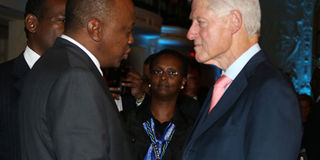Don’t keep warning the corrupt; jail them and throw the key away

President Uhuru Kenyatta and former US President Bill Clinton in Washington, DC on August 4, 2014. If the President is as frustrated as he sounded the other day when he acknowledged publicly what has become common knowledge it is time he did something about it. FILE PHOTO | PSCU
What you need to know:
- Kenyans cannot understand where to turn to when the institutions set up by the Constitution to fight corruption turn out to be run by characters who meet suspects deep in the night.
- The accusations and counter-accusations about graft may provide dramatic copy for newspapers and prime time entertainment on TV, but this is really a sign of a very sick society. What then is the way forward?
- Sometimes I envy those authoritarian countries where the rule of law and due process are a foreign concept. They are able to contain the menace with negligible effort by throwing the miscreants into jail.
If President Uhuru Kenyatta is as frustrated as he sounded the other day when he acknowledged publicly what has become common knowledge — that almost all the institutions in his government are riddled with corruption and rent-seeking has become the national pastime — it is time he did something about it.
It won’t be easy, but it has to be done. For a fact, it seems that everyone is on the take, and in the subterranean world that this hydra-headed creature known as graft dwells, there are few angels. Where, then, can the President get a few good men and women to help him fight it?
It is true that the forces of corruption do fight back viciously when threatened with exposure. Many of the cases currently clogging up our judicial system are symptoms of this war. A man with a huge war-chest of accumulated loot can keep a case going for decades. This is the very definition of impunity.
Kenyans cannot understand where to turn to when the institutions set up by the Constitution to fight corruption turn out to be run by characters who meet suspects deep in the night. They don’t know what to think when important committees of Parliament turn out to be rotten. They are totally bemused when they learn their MPs and MCAs are as easily bought as harlots.
DRAMATIC COPY
The accusations and counter-accusations about graft may provide dramatic copy for newspapers and prime time entertainment on TV, but this is really a sign of a very sick society. What then is the way forward?
“These unsavoury, unethical and corrupt practices continue to be perpetuated and thrive in spite of various reminders and warnings,” thundered the President while issuing a bare-knuckle executive order on graft to public servants.
But that is probably the basic problem. Corrupt people should not be reminded what will happen to them due to their malfeasance. They should not be warned at all. They should be uprooted from society, jailed and the key thrown away.
Sometimes I envy those authoritarian countries where the rule of law and due process are a foreign concept. They are able to contain the menace with negligible effort by throwing the miscreants into jail.
****
THROW STONES
I don’t pretend to be a connoisseur of language but I am fascinated by the way it is used. Having dedicated the best part of my life dissecting its use in our newspapers, I am persuaded that I should not be the first person to throw stones at other writers.
The linguistic challenges we all face, in one degree or the other, are formidable. Anybody who has ever edited a letters to the editor page will understand what I am talking about.
My one abiding beef with the way language is used is when it obscures meaning. I can’t, for instance, understand why some lazybones of a writer, assisted by an indifferent editor, would tell me that some randy chap was jailed for 20 years for “indecently assaulting” his teenage daughter, when all he did was to rape her.
But, as I said, I will not throw any stones just yet, because I, too, in a long career as an editor, have allowed a generous share of howlers to escape undetected, or introduced a few. That is why I can’t be too critical of journalists even when what they write assaults my linguistic sensibilities. I leave that thankless chore to the eminent scholar-journalist and my mentor, Philip Ochieng.
NEARLY LOST MY JOB
Which reminds me of the day I nearly lost my job. That was not due to my ineptitude but because someone, mystified by the workings of the automatic spell-checker, decided to introduce new angle to a story I had neatly edited and correctly placed on the page.
Uganda’s President Yoweri Museveni had made news of some kind, but what came out was that, in fact, he was not the guy responsible but a fellow known as Yowler Unshaven. Since the name repeatedly appeared in the story, it caused quite a stir — and a deal of trouble for me, as I was responsible for the page.
As for the person responsible for my misery, he was banned from the spell-checker for life. But that was no great matter for him; he is one of the best writers in the country today, though his affinity to high technology is still quite suspect.





